Different herbs interact on different functions during the stages of colds and flu. Get the highest benefit out of your herbs by using the right tea for the different stages of colds and flu. Change up teas as the cold progresses, and enjoy these hot, comforting beverages as you recover.
Tea for the Different Stages of Colds and Flu
Your “One Thing” for this week is to understand the stages of a cold or the flu, so that you can treat it appropriately and get comfortable making a cup of hot tea or an infusion.

How to make tea
Your one thing this week is to get comfortable making a cup of hot tea or infusion.
- Place your herb in a cloth or paper tea bag or in a tea ball. Put it in your heatproof mug. Pour boiling water over the herb in the mug.
- Cover and steep the herb for at least 15 minutes. (You can use a tea pot if you like.)
- Sweeten with honey or stevia. (I prefer raw honey for colds and flu, as it soothes and energizes.)
- Sip it slowly.
One thing for a cold or flu? Well it’s complicated
Honestly there isn’t just one thing that you can do for a cold or the flu because what you should do depends on what stage you are at in your sickness.
At the beginning of a cold or flu when you are just beginning to feel achy and tired the fire cider you made last week is a great way to fend off the microbes or viruses. The increased circulation and warmth help your immune system to get into high gear and kick those microbes out of your body. As long as your stomach can handle it, you can take Fire cider often, up to a teaspoon every hour. Go ahead and take it in the middle of the night, too.
Other herbs that can help in the early stage of a cold or flu are echinacea, elderberry, or olive leaf. All three prevent the replication of viruses, either by preventing them from getting inside your cells or by preventing the virus from dividing. These herbs can be taken as teas, tincture, or syrups and you can take them as often as necessary, even hourly. This may be enough to fight the virus, provided you also get sufficient sleep, and maintain good hygiene. (I can’t recommend hand washing enough to help you stay healthy.)
In the next stage of a cold or flu, these remedies don’t work well. In fact you may even feel worse when you take them. This is stage is sometimes called a Herx Reaction. This occurs when your organs of elimination can’t clear the virus or microbes from your body as fast as the microbes are multiplying or dying off. It is indicated by inflammation – flu-like symptoms including headache, joint and muscle pain, body aches, sore throat, general malaise, sweating, chills, nausea or other symptoms. When you do the things you were doing to ward off the sickness, that seemed to be working, suddenly you feel worse. This is the hezx reaction. What should you do?
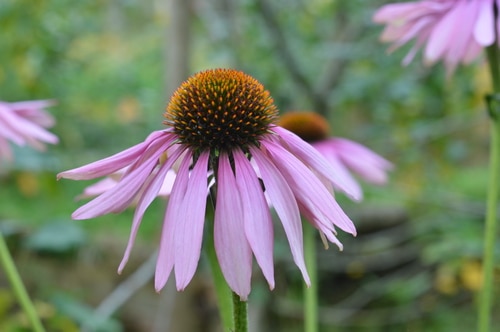
This is the time to switch your protocol. Ease up on the anti-viral herbs like echinacea. Begin using herbs that support and protect your lungs, liver, and kidneys. Herbal teas that offer both therapeutic benefits as well as hydration are helpful. If your stomach is nauseated syrups and honey-based candy can soothe and coat the throat and be easier to absorb than tea. But because hydration is necessary to support your liver and kidneys, you should add warm herbal teas as soon as they can be tolerated.
I’ll be passing along specific recipes in the next few weeks. This week here’s a list of herbs and some of the symptoms they can support you through. For colds and flu use these in a hot tea or infusion for the most therapeutic effect. Note that these herbs have many uses, not just for helping you get through a rough cold or flu. But so that it isn’t overwhelming, here’s the short list.
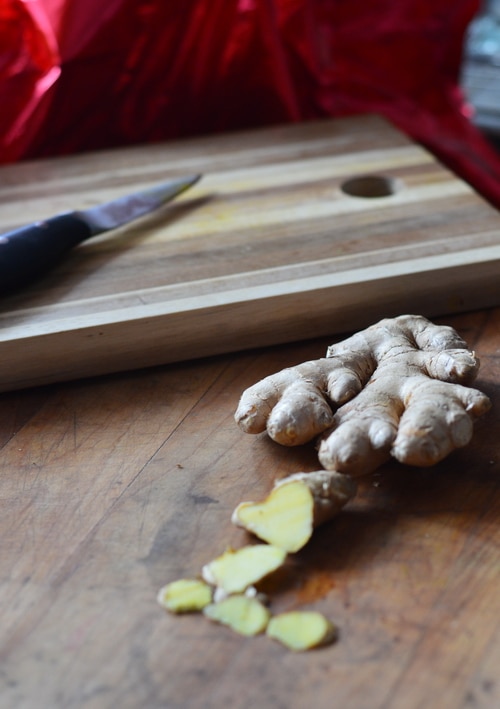
Ginger
Use ginger for nausea, vomiting, upset stomach, sore throat, chills. Ginger is warming. It loosens phlegm and stuffiness. It is antimicrobial and soothing.
Use fresh ginger for colds, and flu. I use a garlic press to squeeze the fresh ginger into a mug and then pour boiled water over it. Cover to let it steep for 15 minutes. Stir in a teaspoon of honey for its throat coating, soothing effect.
The dried powdered ginger is not as beneficial. Candied ginger is good for motion sickness, so keep some in the car or in your carry-on luggage when you travel.
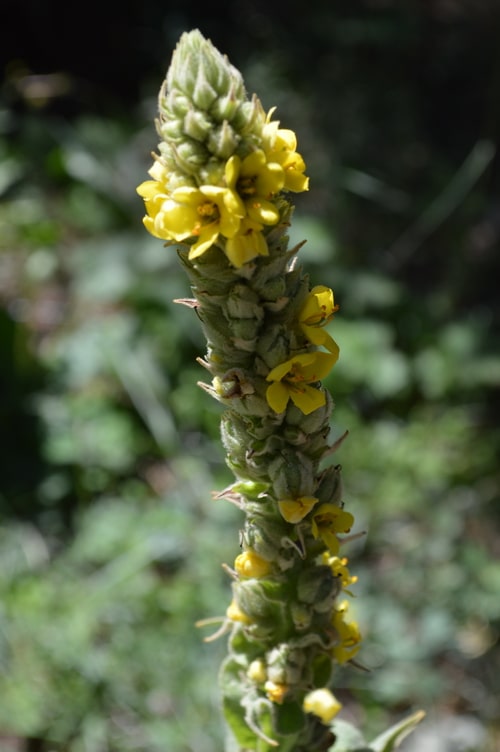
Mullein
Mullein is best taken as a tea. But you’ll want to use a tea bag or a fine mesh strainer so the leaf hairs don’t end up in your mug. Again steep the tea in a covered mug for 15 minutes before drinking. Mullein protects the lungs, loosens mucus, and is a good remedy for colds and flu that are accompanied by coughing, lung congestion, sore throat, or sinus congestion.
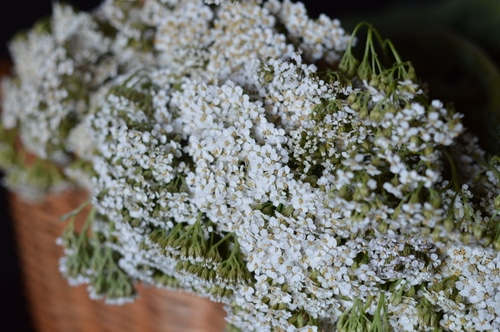
Yarrow
Yarrow is also best taken as a tea for colds and flu. Steep it for 15 minutes in a covered mug. Yarrow is antimicrobial. It promotes sweating so it tricks your body into thinking that the fever has broken and you are on the mend. This can promote faster recovery.
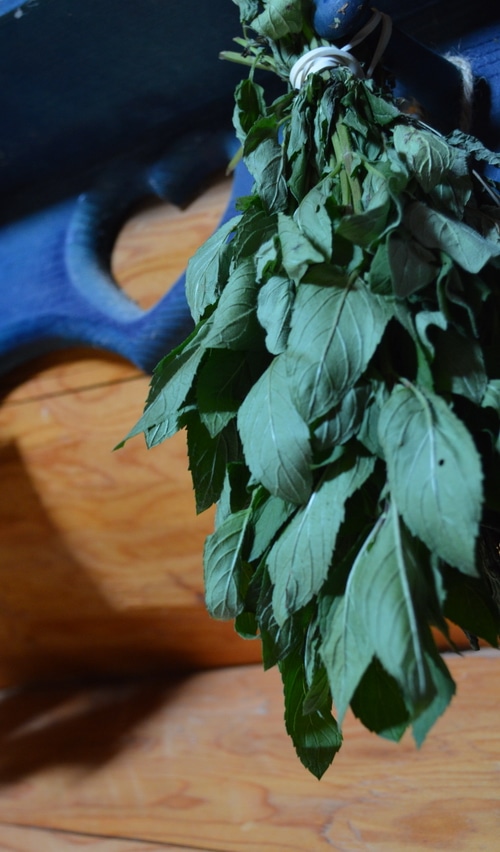
Mint
For colds and flu peppermint helps with sinus and lung congestion and relaxes spasms in the stomach. If you suffer from acid reflux, don’t take peppermint tea immediately before bed. The relaxation effect on the sphincter muscles can increase acid reflux when you lie down. Use peppermint in a hot tea and breathe in the steam for symptomatic relief. Peppermint is also antimicrobial and relaxing to the central nervous system, while making your mind alert. Other aromatic mint family plants like oregano, lemon balm, and monarda/bee balm can also help with colds and flu symptoms, so if peppermint isn’t a favorite of your try one of the others in a hot tea.
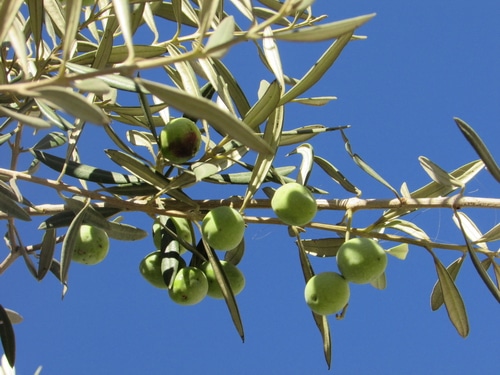
Olive Leaf
You may have taken olive leaf tincture to help ward off the virus or cold at the beginning stages. In the later stages of a virus, switching to olive leaf tea or infusion is a good move. Olive leaf protects the cilia in the lungs from damage. Olive leaf is beneficial especially if you have lung congestion and deep, wracking cough.
Of course, none of this is medical advice. If your symptoms persist, or you or your patient has a high fever, stiffness, persistent coughing, or difficulty breathing see your doctor.
Your Turn:
Which of these remedies will you keep on hand for the times when your normal cold and flu tactics stop working?


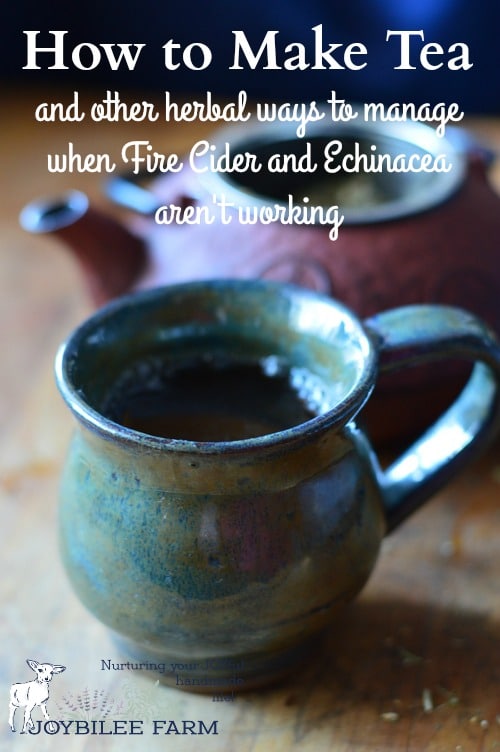

Can these herbal teas be given to children? My children are 10 and 11 years old.
We aren’t accepting guest posts right now, Maureen. Thank you for inquiring.
This post is really cool. I have bookmarked it.
Do you allow guest post on your site ? I can write high
quality posts for you. Let me know.